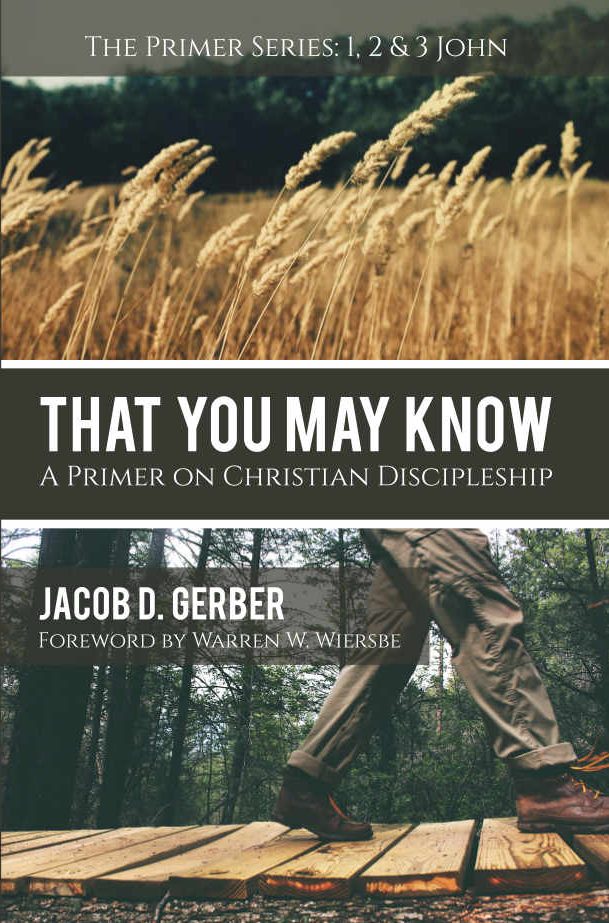Books

While there are many books written about Christian discipleship, there are not nearly enough books on discipleship that primarily expound the Bible itself. The Apostle John wrote three letters, however, with the main purpose of helping disciples to grow.
That You May Know: A Primer on Christian Discipleship is an enriching study that will lead you through John’s teaching on following Jesus as a disciple.
This book is more than a commentary and more than a topical book on the subject of Christian discipleship. Instead, this is a primer on Christian discipleship written as a careful reading of God’s word in 1, 2 & 3 John. It’s ideal for your own individual devotional reading or as a helpful resource for your group Bible study.
Download the First Two Chapters of That You May Know for Free
Bible Studies: Paul's Letter to the Philippians
Studies from my forthcoming pastoral commentary on Paul’s Letter to the Philippians, Have This Mind: A Primer on the Cruciform Life.
Access the complete set of Bible studies from Philippians here.
Bible Studies: The Gospel of John
Access the complete set of Bible studies from the Gospel of John here.
Bible Studies: The Book of Genesis
Access the complete set of Bible studies from Genesis here.
Genesis 13:1–18: The Conciliation of Abram
Even in the fallout of failure and doubt, God gives us by faith what we forfeit by sight. (Exposition of Genesis 13:1–18)
Genesis 12:10–20: The Captivity of Abram
Abram’s sojourn in Egypt illustrates an enduring pattern: God’s covenant corrects our conspiracies. (Exposition of Genesis 12:10–20)
Genesis 12:4–9: The Conquest of Abram
Abram’s example of public witness and worship to the living God teaches us how to bear witness to the already/not-yet kingdom of Jesus Christ. (Exposition of Genesis 12:4–9)
Genesis 11:27–12:3: The Call of Abram
To redeem the world from the fullness of its depravity, God chooses a paradoxical approach: raising up one man through whom he will bless the world. (Exposition of Genesis 11:27–12:3)
Genesis 11: The End of the Beginning
The world’s solution to the problem of sin is to build a taller tower to reach up to God. The gospel insists that God must reach down to us.(Exposition of Genesis 11)
Genesis 9:18–10:32: Dispersal of the Nations
Even after a fresh start, Noah fails to become the new Adam who can save humanity. Instead, humanity must await the offspring of Noah’s son Shem. (Exposition of Genesis 9:18–10:32)
Bible Studies: Paul's First Letter to the Corinthians
Access the current set of Bible studies from 1 Corinthians here.
Bible Studies: The Letters of John
Access the complete set of Bible studies from the Letters of John here.
Bible Studies: The Gospel of Luke
Access a handful of Bible studies from the Gospel of Luke here. These were studies written during the Advent season of 2018. At the moment, I do not have plans to continue working through the Gospel of Luke; however, I wanted to make these few studies available online for whomever may benefit from them.
Bible Studies: The Book of Ecclesiastes
Access the complete set of Bible studies from the Book of Ecclesiastes here.
Bible Studies: The Gospel of Matthew
Matthew 17:9–13: Elijah Must Come
Elijah did come through the person of John the Baptist—and he suffered. We cannot see the glory of Jesus except through suffering. (Exposition of Matthew 17:9–13)
Matthew 17:1–8: “Listen to Him!”
The transfiguration of Jesus counter-intuitively emphasizes listening, rather than looking, at Jesus: Listen to Jesus as we await his appearing. (Exposition of Matthew 17:1–8)
Matthew 16:24–28: The Cross and the Kingdom
Not only must Jesus suffer, but his disciples must take up crosses to follow him. We enter Jesus’ kingdom through Jesus’ cross. (Exposition of Matthew 16:24–28)
Matthew 16:21–23: The Cross and the Things of God
While Peter rightly confessed Jesus’ identity, he fully misunderstand’s Jesus’ mission. Christ crucified is the wisdom of God. (Exposition of Matthew 16:21–23)
Matthew 16:13–20: “Who Do You Say that I Am?”
Our relationship with God requires more than words, but not less than words. Confess that Jesus is the Christ, the Son of God. (Exposition of Matthew 16:13–20)
Matthew 16:5–12: Beware the Leaven of the Pharisees and Sadducees
As Jesus warns his disciples about the leaven of the Pharisees and Sadducees, they begin arguing about bread. Don’t miss the signs about Jesus! (Exposition of Matthew 16:5–12)












